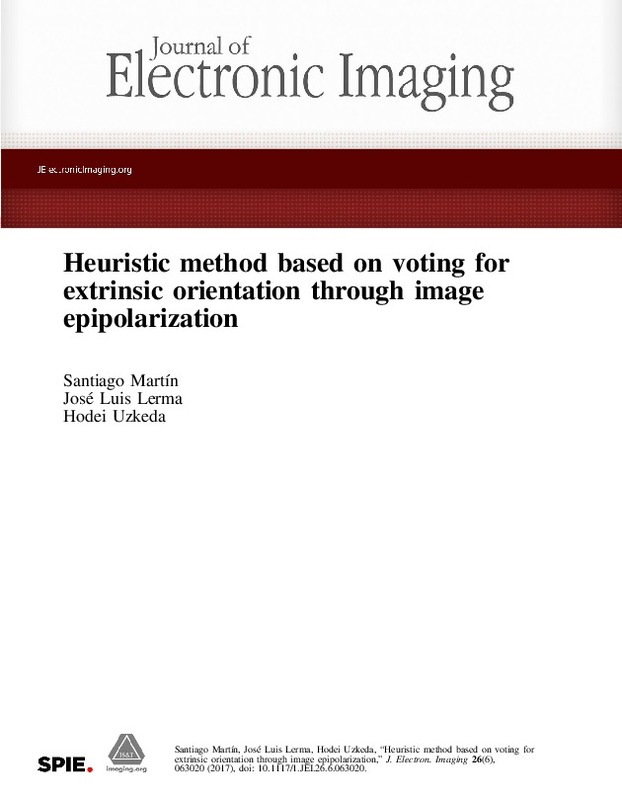JavaScript is disabled for your browser. Some features of this site may not work without it.
Buscar en RiuNet
Listar
Mi cuenta
Estadísticas
Ayuda RiuNet
Admin. UPV
Heuristic method based on voting for extrinsic orientation through image epipolarization
Mostrar el registro sencillo del ítem
Ficheros en el ítem
| dc.contributor.author | Martín, Santiago
|
es_ES |
| dc.contributor.author | Lerma García, José Luis
|
es_ES |
| dc.contributor.author | Uzkeda, Hodei
|
es_ES |
| dc.date.accessioned | 2018-09-28T04:32:08Z | |
| dc.date.available | 2018-09-28T04:32:08Z | |
| dc.date.issued | 2017 | es_ES |
| dc.identifier.issn | 1017-9909 | es_ES |
| dc.identifier.uri | http://hdl.handle.net/10251/108472 | |
| dc.description.abstract | [EN] Traditionally, the stereo-pair rectification, also known as epipolarization problem, (i.e., the projection of both images onto a common image plane) is solved once both intrinsic (interior) and extrinsic (exterior) orientation parameters are known. A heuristic method is proposed to solve both the extrinsic orientation problem and the epipolarization problem in just one single step. The algorithm uses the main property of a coplanar stereopair as fitness criteria: null vertical parallax between corresponding points to achieve the best stereopair. Using an iterative approach, each pair of corresponding points will vote for a rotation axis that may reduce vertical parallax. The votes will be weighted, the rotation applied, and an iteration will be carried out, until the vertical parallax residual error is below a threshold. The algorithm performance and accuracy are checked using both simulated and real case examples. In addition, its results are compared with those obtained using a traditional nonlinear least-squares adjustment based on the coplanarity condition. The heuristic methodology is robust, fast, and yields optimal results. | es_ES |
| dc.description.sponsorship | The authors gratefully acknowledge the support from the Spanish Ministerio de Economia y Competitividad to the Project No. HAR2014-59873-R. | en_EN |
| dc.language | Inglés | es_ES |
| dc.publisher | SPIE - International Society for Optical Engineering | es_ES |
| dc.relation.ispartof | Journal of Electronic Imaging | es_ES |
| dc.rights | Reserva de todos los derechos | es_ES |
| dc.subject | Epipolarization | es_ES |
| dc.subject | Epipolar geometry | es_ES |
| dc.subject | Extrinsic orientation | es_ES |
| dc.subject | Image rectification | es_ES |
| dc.subject | Relative orientation | es_ES |
| dc.subject.classification | INGENIERIA CARTOGRAFICA, GEODESIA Y FOTOGRAMETRIA | es_ES |
| dc.title | Heuristic method based on voting for extrinsic orientation through image epipolarization | es_ES |
| dc.type | Artículo | es_ES |
| dc.identifier.doi | 10.1117/1.JEI.26.6.063020 | es_ES |
| dc.relation.projectID | info:eu-repo/grantAgreement/MINECO//HAR2014-59873-R/ES/ANALISIS ESPECTROFOTOMETRICO Y CALIBRACION DE CAMARAS APLICADOS AL ESTUDIOS DEL ARTE RUPESTRE/ | es_ES |
| dc.rights.accessRights | Abierto | es_ES |
| dc.contributor.affiliation | Universitat Politècnica de València. Departamento de Ingeniería Cartográfica Geodesia y Fotogrametría - Departament d'Enginyeria Cartogràfica, Geodèsia i Fotogrametria | es_ES |
| dc.description.bibliographicCitation | Martín, S.; Lerma García, JL.; Uzkeda, H. (2017). Heuristic method based on voting for extrinsic orientation through image epipolarization. Journal of Electronic Imaging. 26(6):063020-1-063020-11. https://doi.org/10.1117/1.JEI.26.6.063020 | es_ES |
| dc.description.accrualMethod | S | es_ES |
| dc.relation.publisherversion | https://doi.org/10.1117/1.JEI.26.6.063020 | es_ES |
| dc.description.upvformatpinicio | 063020-1 | es_ES |
| dc.description.upvformatpfin | 063020-11 | es_ES |
| dc.type.version | info:eu-repo/semantics/publishedVersion | es_ES |
| dc.description.volume | 26 | es_ES |
| dc.description.issue | 6 | es_ES |
| dc.relation.pasarela | S\347759 | es_ES |
| dc.contributor.funder | Ministerio de Economía, Industria y Competitividad | es_ES |








